Fearless Frank
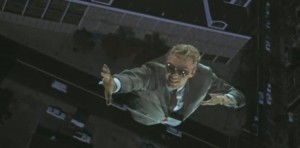 In the days where there were no such things as digital video and affordable cameras for the consumer, it must have been fun to work simultaneously without a net and on a low budget. That way, you could experiment with formats and ideas — even if they weren’t fully formed ideas — playing around with genres. And all you had to do was stick the satire label on it (think Godard’s Breathless). It didn’t have to make sense and it could be one of the best ways, as a young filmmaker, to show off your skills for future projects (nowadays referred to as a calling card*).
In the days where there were no such things as digital video and affordable cameras for the consumer, it must have been fun to work simultaneously without a net and on a low budget. That way, you could experiment with formats and ideas — even if they weren’t fully formed ideas — playing around with genres. And all you had to do was stick the satire label on it (think Godard’s Breathless). It didn’t have to make sense and it could be one of the best ways, as a young filmmaker, to show off your skills for future projects (nowadays referred to as a calling card*).
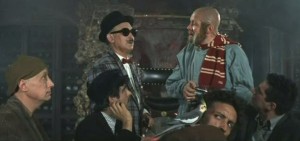 One of the best examples of these types of films is Brian De Palma’s Greetings, which is an entertaining mess of political ideas, Hitchcock mockery, Godard rip-offs, and lowbrow sex jokes — without much of a narrative drive to tie things together.
One of the best examples of these types of films is Brian De Palma’s Greetings, which is an entertaining mess of political ideas, Hitchcock mockery, Godard rip-offs, and lowbrow sex jokes — without much of a narrative drive to tie things together.
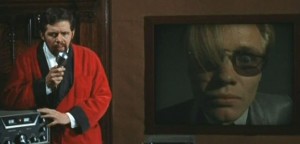 Philip Kaufman’s Fearless Frank — which, like Greetings, was released in the late 1960s — is a mess, too. But not so entertaining as to remain anything other than a curious example of a filmmaker too scared to take his material seriously. Kaufman would later make The Right Stuff and the superior 1978 remake of Invasion of the Body Snatchers, and he had already been acclaimed by critics at Cannes in 1965 for his surrealist experimental first film Goldstein, which was more of a student film mistaken for something profound.
Philip Kaufman’s Fearless Frank — which, like Greetings, was released in the late 1960s — is a mess, too. But not so entertaining as to remain anything other than a curious example of a filmmaker too scared to take his material seriously. Kaufman would later make The Right Stuff and the superior 1978 remake of Invasion of the Body Snatchers, and he had already been acclaimed by critics at Cannes in 1965 for his surrealist experimental first film Goldstein, which was more of a student film mistaken for something profound.
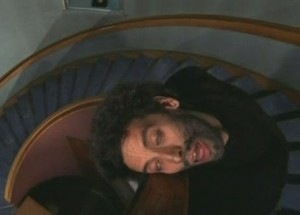 Fearless Frank also played Cannes (in 1967), but sort of in the same way that Roland Emmerich’s Godzilla opened Cannes in 1998. Fearless Frank is a superhero parody in the vein of the Adam West version of Batman (and later John Frankenheimer’s 99 and 44/100% Dead). That seems more than a curious choice; the self-mocking cheese and Roy Lichtenstein pop art style of the credits (Boom! Wham! Thwack!) of the TV show and movie of the 1966 version of Batman is already so specific.
Fearless Frank also played Cannes (in 1967), but sort of in the same way that Roland Emmerich’s Godzilla opened Cannes in 1998. Fearless Frank is a superhero parody in the vein of the Adam West version of Batman (and later John Frankenheimer’s 99 and 44/100% Dead). That seems more than a curious choice; the self-mocking cheese and Roy Lichtenstein pop art style of the credits (Boom! Wham! Thwack!) of the TV show and movie of the 1966 version of Batman is already so specific.
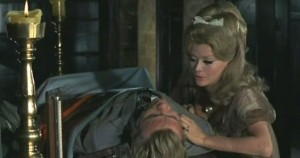 Kaufman’s film, with a cast made up of Second City alumni, is more scattered and a lot of the humor that develops was probably unintentional. Frank (in a nod to Frankenstein) is a good ‘ole boy, played, in his first feature, by Jon Voight. Frank attempts to court gangster moll and abundantly endowed Plethora (played by Monique van Vooren). She’s supposed to be a knockout, but Plethora looks like a drag queen in close-up. After Frank is murdered by the gangsters who “protect” Plethora, he’s discovered and revived by a doctor who is supposed to be pure and trying to teach Frank how to help mankind. But the doctor just looks like a bearded Jerry Lewis. Voight has to play the hick and the evil version of Frank that the doctor’s arch enemy develops. But there’s no way to separate it from his more famous role in Midnight Cowboy, especially when Frank tries to be suave and pick up women at a bar.
Kaufman’s film, with a cast made up of Second City alumni, is more scattered and a lot of the humor that develops was probably unintentional. Frank (in a nod to Frankenstein) is a good ‘ole boy, played, in his first feature, by Jon Voight. Frank attempts to court gangster moll and abundantly endowed Plethora (played by Monique van Vooren). She’s supposed to be a knockout, but Plethora looks like a drag queen in close-up. After Frank is murdered by the gangsters who “protect” Plethora, he’s discovered and revived by a doctor who is supposed to be pure and trying to teach Frank how to help mankind. But the doctor just looks like a bearded Jerry Lewis. Voight has to play the hick and the evil version of Frank that the doctor’s arch enemy develops. But there’s no way to separate it from his more famous role in Midnight Cowboy, especially when Frank tries to be suave and pick up women at a bar.
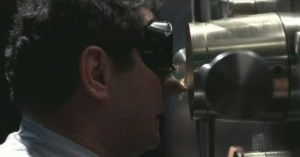 Other than these unfortunate coincidences, it’s also clear that Kaufman was working with a limited amount of footage. Fearless Frank plays like an entire movie made out of discarded reshoots from other movies. The pacing is glacial and, rather than have scene transitions or conclusions, the movie just cuts to another set somewhere else. Either you have to admire Kaufman’s ingenuity in shooting what amounts to a home movie in Cinemascope, using disparate elements like an ersatz Godfrey Ho (a producer who often edits together unrelated and/or unfinished kung fu films together, such as Ninja Terminator, to sell to foreign markets), or criticize him for being desperate enough to have a character who is in the film for about 30 seconds, narrate the entire movie to tie the footage together.
Other than these unfortunate coincidences, it’s also clear that Kaufman was working with a limited amount of footage. Fearless Frank plays like an entire movie made out of discarded reshoots from other movies. The pacing is glacial and, rather than have scene transitions or conclusions, the movie just cuts to another set somewhere else. Either you have to admire Kaufman’s ingenuity in shooting what amounts to a home movie in Cinemascope, using disparate elements like an ersatz Godfrey Ho (a producer who often edits together unrelated and/or unfinished kung fu films together, such as Ninja Terminator, to sell to foreign markets), or criticize him for being desperate enough to have a character who is in the film for about 30 seconds, narrate the entire movie to tie the footage together.
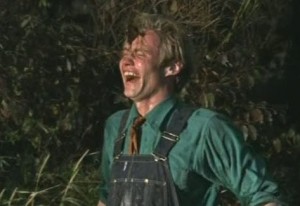 Such panic by Kaufman probably resulted in a damsel-in-distress named Lois [Lane] and a butler/protector named Alfred. But the blatancy of the jokes makes Fearless Frank closer to Ray Dennis Steckler’s lazy 1966 Batman parody Rat Pfink a Boo Boo (and certainly paved the way for parodies of parodies like Epic Movie/Date Movie/Meet the Spartans). Kaufman’s film has more energy and wit than Steckler’s (not much of an accomplishment), and the rhythm and style of his humor, specifically the silly puns and acknowledgments of the 4th wall (“after all these years as a loyal butler, I still haven’t gotten a recommendation”) are very much in step with Mel Brooks who, by 1967, had yet to begin his film career. If anything rather than worrying about a straightforward narrative (his first, since Goldstein was an avant-garde film), Kaufman needed to go more wacky. Perhaps he should have called up John Waters and hired some real drag queens for the love interest?
Such panic by Kaufman probably resulted in a damsel-in-distress named Lois [Lane] and a butler/protector named Alfred. But the blatancy of the jokes makes Fearless Frank closer to Ray Dennis Steckler’s lazy 1966 Batman parody Rat Pfink a Boo Boo (and certainly paved the way for parodies of parodies like Epic Movie/Date Movie/Meet the Spartans). Kaufman’s film has more energy and wit than Steckler’s (not much of an accomplishment), and the rhythm and style of his humor, specifically the silly puns and acknowledgments of the 4th wall (“after all these years as a loyal butler, I still haven’t gotten a recommendation”) are very much in step with Mel Brooks who, by 1967, had yet to begin his film career. If anything rather than worrying about a straightforward narrative (his first, since Goldstein was an avant-garde film), Kaufman needed to go more wacky. Perhaps he should have called up John Waters and hired some real drag queens for the love interest?
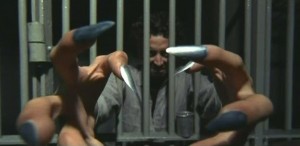 * In the 1980s, Paramount’s Friday the 13th series was thought of as the “minor leagues” for up-and-coming filmmakers. Parts III-VIII were directed by six different small-time directors who were trying to establish themselves. Paramount sold the rights to New Line for subsequent sequels. But each of the follow-ups, including the recent remake and Freddy vs. Jason had one-off directors.
* In the 1980s, Paramount’s Friday the 13th series was thought of as the “minor leagues” for up-and-coming filmmakers. Parts III-VIII were directed by six different small-time directors who were trying to establish themselves. Paramount sold the rights to New Line for subsequent sequels. But each of the follow-ups, including the recent remake and Freddy vs. Jason had one-off directors.



